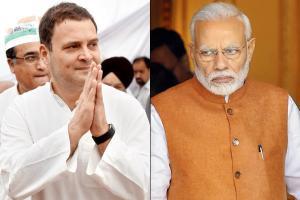Modi has already lost the rural vote to Rahul, and empty promises and swagger won't convince urban citizens waiting for job creation

After Rahul Gandhi delivered on his promise to waive farm loans in three states, Modi's party, BJP, quickly followed suit in two of its own states. File Pics
 Modi demonetised the farmer. Rahul compensated the farmer." This aphorism spread on social media over the weekend, even if there aren't many farmers wasting time on their timelines.
Modi demonetised the farmer. Rahul compensated the farmer." This aphorism spread on social media over the weekend, even if there aren't many farmers wasting time on their timelines.
ADVERTISEMENT
Prime Minister Narendra Modi and his BJP take this aphorism seriously. During the election in Rajasthan, Madhya Pradesh and Chattisgarh, Congress President Rahul Gandhi promised to waive farm loans. His party won the three Hindi heartland states, and the newly sworn-in chief ministers proceeded to implement his promise. The BJP quickly waived farmers' loans in two states that it rules, Gujarat and Assam. More BJP-ruled states will undoubtedly follow suit, given Modi's personal stakes in the 2019 parliamentary election - every few days, speculation surfaces on potential replacement PMs, should Modi fall significantly short of a Lok Sabha majority.
Some say that farm loan waivers constitute mediocre economic policy (or no policy at all). That is not true - ask any farmer who verges on suicide because of crushing debt.
Dr Manmohan Singh returned to power in 2009 in no small part thanks to the Rs 60,000-crore farm loan waiver in the budget presented in 2008 (even if the loan waiver was a last-minute addition). Of course, Indian agriculture needs better policies, as former finance minister Yashwant Sinha and I have outlined in our just-released book, India Unmade: How the Modi Government Broke the Economy (Juggernaut Books). Farming in India contains a dubious paradox - India's largest private enterprise is also its most regulated.
Modi's government promised to double farmers' incomes but failed. Its irrigation scheme is lopsided in implementation in the states. The crop insurance scheme benefits insurance companies more than it does farmers. But above all, what hurt Indian agriculture was Modi's blunder of demonetising high-denomination currency in November 2016. You know the details. A predicted consequence of demonetisation that proved true was the destruction of rural supply chains and the drying up of agricultural credit. When demonetisation hit, less cash meant less consumption of crop and produce, and it also meant less money to buy seeds, fertiliser, etc, for the next round of sowing.
Demonetisation led to rural distress. (It also led to distress in the micro, small and medium enterprise sector, leading to a government plan to raid the Reserve Bank of India (RBI)'s reserves, leading to Urijit Patel's resignation as RBI Governor, but more on that on another occasion.) The farmers let Modi know how angry they felt over his nutty "disruptive governance" by booting his party out of government in three Hindi-speaking states.
Incidentally, despite the scattered evidence of electoral malpractices (like deletion of voters from rolls, etc) Telangana gave a thumping endorsement to its government, and one major reason is chief minister K Chandrashekhar Rao's Rythu Bandhu programme, which gives financial support to farmers at Rs 8,000 per acre. It helps the farmer with credit, purchase of seeds and equipment, etc. In India Unmade, we discuss this programme as a model for the entire country. It would obviate the need for loan waivers, and despite a considerable outlay of say, Rs 2 to 3 lakh crore at the outset, could set agriculture on a higher growth trajectory - which in turn is the bed-rock for an overall higher GDP growth trajectory (our country needs double-digit GDP growth for substantial job creation).
Modi will try to cure himself of his self-inflicted wounds in the run-up to the elections. Having installed a favoured ex-bureaucrat as RBI Governor, his government this week announced it would infuse R83,000 crore into public sector banks (taking the total infusion to Rs 1.06 lakh crore for 2018-19) - it is meant to help banks facing prompt corrective action and borderline banks to improve their capital ratio, so that they may start lending to businesses again, so that businesses may grow and expand and thereby become engines of job creation. His government also announced a reduction of the Goods and Services Tax (GST) on dozens of items, at a cost of R5,500 crore to its revenues; it is to address the biggest complaint against the sloppily implemented GST in July 2017 - that it was mind-bogglingly complicated. It may also make middle-class consumers happy.
However, there is too little time for a turnaround in the economy before the parliamentary election. Modi may harp on all his initiatives and the fact that India registers the highest GDP growth among big economies (despite his government's continued rejigging of official statistics, the sole purpose of which is simply to make Modi look better than Dr Singh), but without job creation voters will pay scant attention. And no matter what Modi does on the rural front, Rahul has already seized the initiative. It will be difficult to seize back. No wonder the aphorism mentioned at the beginning is spreading like wildfire.
Aditya Sinha is a writer and columnist. His latest book 'India Unmade: How the Modi Government Broke the Economy', with Yashwant Sinha, is out now. He tweets @autumnshade Send your feedback to mailbag@mid-day.com
Catch up on all the latest Mumbai news, crime news, current affairs, and also a complete guide on Mumbai from food to things to do and events across the city here. Also download the new mid-day Android and iOS apps to get latest updates
 Subscribe today by clicking the link and stay updated with the latest news!" Click here!
Subscribe today by clicking the link and stay updated with the latest news!" Click here!







